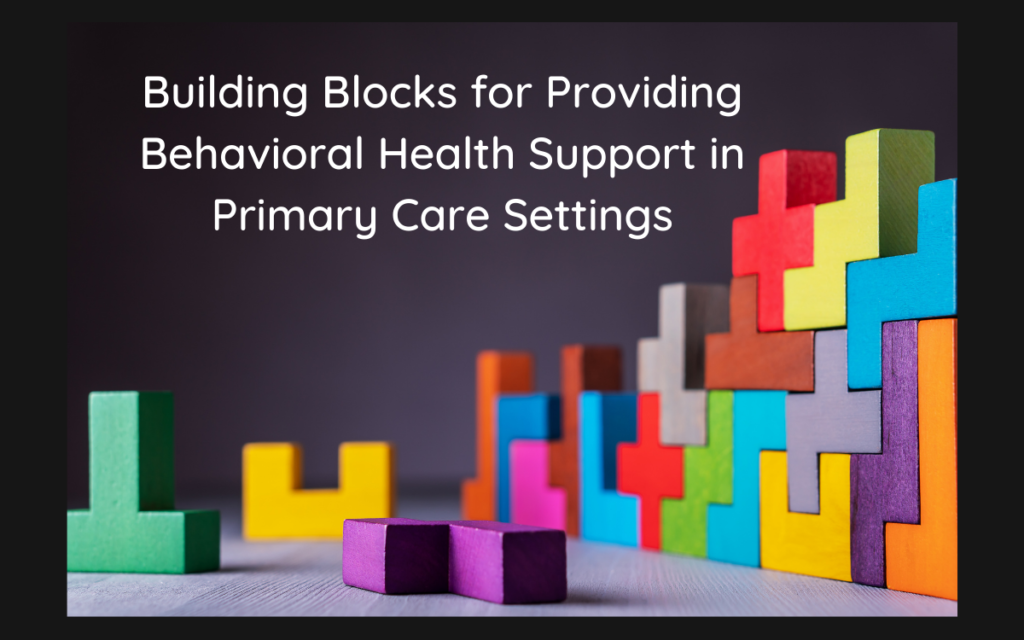Framework includes flexible options that payers and providers can use to adopt integrated behavioral health and primary care making access to whole-person care more available
Washington, D.C., June 9, 2022 — Today, in partnership with Well Being Trust, the Eugene S. Farley, Jr. Health Policy Center and the Practice Innovation Program at the University of Colorado released The Building Blocks of Behavioral Health Integration: A Framework for Care Delivery Expectations. This new framework provides flexible options for primary care clinics to integrate behavioral health services that could be utilized as part of alternative payment models supporting whole-person care.
Research shows that integrating behavioral health care in primary care settings improves outcomes, including:
- Youth receiving integrated care had a 66% probability of having a better behavioral health outcome.
- Adults with depression and anxiety were 31% and 41% more likely, respectively, to have an improved outcome compared to those in practices without integrated care.
- Cost savings of 5-10% over a two-to-four-year period, representing a more than two-to-one return on investment.
Despite these benefits, behavioral health integration has yet to be widely implemented in primary care practices, in large part due to inadequate payment mechanisms. Alternative payment models, particularly those providing prospective payment with more flexible funds for behavioral health integration, can help scale behavioral health integration.
To put such alternative payment models into place, practices need clear expectations for care delivery and payers need demonstrated accountability to care capacities. The framework detailed in this report provides a needed balance of standardization and flexibility for this work.
“Almost all people will experience a need for mental health or addiction services within their lifetimes, but many are unable to access this care,” said Benjamin F. Miller, PsyD, president, Well Being Trust. “Primary care is generally the first place people come to with any health issue. Bringing mental health clinicians onsite into primary care allows for a more seamless and integrated approach to care that’s better for the patient and their family.”
Stephanie Gold, M.D., lead author of the report, added, “Practices want to deliver this whole-person care, patients want to receive more of their care in one place, and payers want to support what will be better for patients and can lead to cost savings. Implementing the building blocks of behavioral health integration, tied to alternative payment models, will support this needed advancement in care.”
Learn more and download the full framework and the report.
###
Media Contacts:
Alison Reidmohr, 303-724-4908, alison.reidmohr@cuanschutz.edu
Amy Shields, 214-208-7942, amy@wellbeingtrust.org
About Well Being Trust
Well Being Trust is an impact philanthropy dedicated to advancing the mental, social, and spiritual health of the United States. We believe the health of our mind is inseparable from the health of our body and spirit. Our goal is to save lives from deaths of despair and to increase equitable well-being for all. We are committed to improving systems of care, coverage, and community conditions as essential to addressing the most critical mental health challenges facing America. For more information, visit wellbeingtrust.org and follow us on Twitter, @WellBeingTrust.
About the Eugene S. Farley, Jr. Health Policy Center
The Eugene S. Farley, Jr. Health Policy Center develops and translates evidence into policy to advance comprehensive, integrated strategies that improve individual, family, and population health. This work includes providing adaptive, technical, and leadership assistance to state agencies and policy leaders related to system transformation, finance and payment policy, workforce development, community-based prevention and well-being, and social policy to advance equity. For more information, visit our website or follow us on Twitter, @FarleyHealthPol.
About the Practice Innovation Program at the University of Colorado
The Practice Innovation Program at the University of Colorado Anschutz Medical Campus coordinates the Colorado Health Extension System (CHES), which convenes numerous Practice Transformation Organizations across the state. These organizations deploy Regional Health Connectors in communities and match Practice Facilitators and Clinical Health Information Technology Advisors into practices. Together, the Practice Innovation Program at CU and CHES guide learning networks that spread best practices and connect participants to local, state, and national transformation resources.






